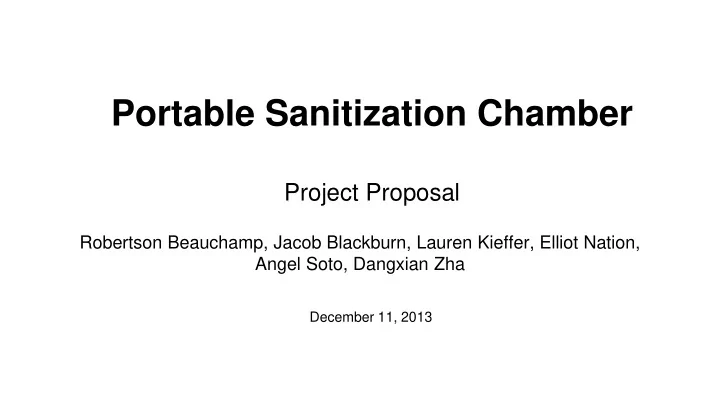

Portable Sanitization Chamber Project Proposal Robertson Beauchamp, Jacob Blackburn, Lauren Kieffer, Elliot Nation, Angel Soto, Dangxian Zha December 11, 2013
Overview • Client • Objectives & Constraints • Project Plan • Concepts • Engineering Analysis • Final Design Robertson Beauchamp 1
Client • W.L. Gore & Associates, Inc. • International Company • Medical, fabrics, and other products • Local office in Flagstaff, AZ • Looking to prepare incoming engineers by sponsoring real-world application projects. Robertson Beauchamp 2
Need Statement • The client currently has access to sterilization systems that use either harsh chemicals, or a large amount of heat that can damage various materials. • The client needs a current sanitization device that is portable and safe for various materials such as plastics and papers. Jacob Blackburn 3
Goal • Develop a portable sanitization process that disinfects bioburden amounts past acceptable levels and is safe for various materials. Jacob Blackburn 4
Objectives • Sanitizes within regulation bioburden levels • Chemical exposure and residue within regulated concentration • Materials sanitized retain functionality • Sanitization system characterizes portability • Cost to produce is comparatively inexpensive • Quick sanitization cycle time Jacob Blackburn 5
Design Specifications 6 Jacob Blackburn
Operating Environment ● Sanitize test strips contaminated with Bacillus atrophaeus used to evaluate bioburden level reduction ● Hydrogen peroxide test strips placed within chamber proximity to monitor exposure levels Jacob Blackburn 7
QFD Jacob Blackburn 8
House of Quality 9 Jacob Blackburn
Autoclave • Hot water sanitization • Above 135 o C for at least 3 minutes • Too hot for certain materials • Water would deteriorate certain materials Lauren Kieffer 10
Electron Beam • Sanitizes through items • Expensive • Large scale Courtesy of www.ebeamservices.com Lauren Kieffer 11
Laser Sanitization • Works with many materials • Long cycle time • Expensive Lauren Kieffer 12
Infrared Radiation • Advantages: • Disadvantages: o Low cycle time o Cost to produce o Compact o Power required o Minimum maintenance o Material incompatibility o Ease of use Lauren Kieffer 13
Chemical Processes • Chemicals can kill 99% of bacteria • Dry fog chemical sanitization • Hydrogen Peroxide (H 2 O 2 ) is a safe chemical • Entire rooms can be cleaned in 15-30 minutes Lauren Kieffer 14
Chemical Fogging Courtesy of http://www.gotfog.com Lauren Kieffer 15
Hydrogen Peroxide Fogging Filter Placement Fogging Device Lauren Kieffer 16
Chemical Fogging • 7% hydrogen peroxide solution • Cold vapor is safe for materials sensitive to heat and water • Filters must be used to break down H 2 O 2 Lauren Kieffer 17
Material Selection • Must be compatible with H 2 O 2 at various concentrations. • Aluminum, PVC and PTFE - No negative reactions • Aluminum used for enclosure, door, handles, hinges, etc. • PVC and PTFE used in fogging components, tubing and nozzle. Lauren Kieffer 18
Ultraviolet Light • Maximum kill potential 2-15 minutes • Cost efficient • Only sanitizes outer surface • Bulbs must be regularly cleaned Angel Soto 19
Ultraviolet Germicidal Irradiation Angel Soto 20
Ultraviolet Germicidal Irradiation Angel Soto 21
Ultraviolet Model Angel Soto 22
Weighting Characteristics Angel Soto 23
Decision Matrix Angel Soto 24
Combined UV/H 2 O 2 Process • Eliminates need for filter • Creates free hydroxyl radicals, OH-, that are strong oxidizing agents. • Radicals degrade additional toxins. • Study shown this process inactivates Bacillus atrophaeus spores. Elliot Nation 25
UV/H 2 O 2 Process Courtesy of: www.trojanuv.com Elliot Nation 26
Material Selection • Aluminum used for enclosure. • PVC and PTFE used in fogging device. • Borosilicate glass used in between enclosure and UV lights. • High UV transmittance, protects bulbs from fog and dust. Elliot Nation 27
Final Design • Drawing highlights key dimensions • Portability is achieved 28 Elliot Nation
Component View Final Design Model 3D Representation Elliot Nation 29
Mass Calculation Dangxian Zha 30
Cost Dangxian Zha 31
Project Plan Dangxian Zha 32
Project Plan Dangxian Zha 33
Conclusion • The combined UV/H 2 O 2 process achieves design specifications by reducing bioburden levels past a certain threshold. Robertson Beauchamp 34
References Carlson, C., The Use of UV Lights for Disinfection. Arizona State University, From: https://cfo.asu.edu/node/2667 Cole-Parmer. Material Compatibility With Hydrogen Peroxide. From: http://www.ozoneservices.com/articles/004.htm Ellis R.J, Moss C.E, W.E. Murray and W.H. Parr, Infrared Radiation, 2013. Heraeus Noblelight LLC, Infrared Heat for Disinfection in the Food Industry, 2013. Iannotti, M. T. and Pisani Jr. R., Inactivation of Bacillus atrophaeus spores in healthcare waste by uv light coupled with H2O2. Braz. J. Chem. Eng. [online]. 2013, vol.30, n.3 [cited 2013-12-10], pp. 507-519. Occupational Safety and Health Administration, General Industry 29 CFR 1910: Hazardous and Toxic Substances, U. S. Department of Labor, Subpart Z. from url:https://www.osha.gov/ SLTC/hazardoustoxicsubstances/index.html PathCon Laboratories, The Microbial Bioburden of USP 797 Compliance, 2009 35
References Rao, Shridhar PN, Sterilization and Disinfection, 2009. Rutala, W., Weber, D., Guideline for Disinfection and Sterilization in Healthcare Facilities, 2008, Department of Health and Human Services, 2008 Sakthivel, S. and Kisch, H. (2003), Daylight Photocatalysis by Carbon-Modified Titanium Dioxide. Angew. Chem. Int. Ed., 42: 4908 – 4911. doi: 10.1002/anie.200351577 Ultraviolet Disinfection: Crucial Link in the Sterilization Chain. Terra Universal Inc. From: http://www.terrauniversal.com/images/tools/catalog/uvc_germicidal_irradiation_082510135200. pdf W.L. Gore, Portable Sanitization Chamber for Medical Manufacturing Use, 2013. 36
Questions? 37
Recommend
More recommend